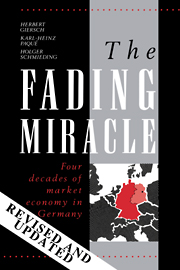Book contents
Preface
Published online by Cambridge University Press: 09 February 2010
Summary
This book is an essay in applied economics, not in economic history. To be sure, history is its subject matter, but the main interest of the authors – all of them economists – was to describe and evaluate a long chain of events in the light of their own economic understanding. Hence, the book is addressed above all to students of economics and interested laymen, not necessarily professional historians who would like to learn new facts about West German post-war economic history. The reader we have in mind should be familiar with the basic tools of economic reasoning and should have a keen interest in history; no more is required.
Reality can hardly be understood unless it is deliberately simplified by abstraction. We had to abstract from numerous facts and relationships that others might have wished to stress. Admittedly, the choice is subjective: idiosyncrasies may have come in, though we tried to avoid them. No doubt, Marxists would have seen things through different conceptual glasses. But we believe that our ‘individualistic approach’, which regards markets rather than classes as the decisive force of economic history, yields a quite consistent interpretation of actual events, at least in the case of West Germany since the Second World War.
In our view, the main lesson comes down to one fundamental proposition: miracles emerge when spontaneity prevails over regulation, and they fade when corporatist rigidities impair the flexibility for smooth adjustment.
- Type
- Chapter
- Information
- The Fading MiracleFour Decades of Market Economy in Germany, pp. xi - xivPublisher: Cambridge University PressPrint publication year: 1992
- 2
- Cited by

